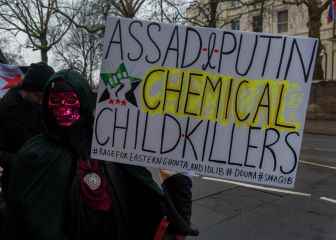US President Joe Biden declared on Wednesday that there is a “real threat” that Russia will use chemical weapons in Ukraine. This Thursday, NATO Secretary General Jens Stoltenberg warned that the launch of a chemical attack in Ukraine “would greatly change the nature” of the war that is being waged there and could also affect neighboring allied countries. But what are chemical weapons and why are they causing such a stir?
Chemical weapons
According to Organization for the Prohibition of Chemical Weapons (OPCW), a chemical weapon is “a chemical substance used to intentionally cause harm or death through its toxic properties”. The toxic chemical is found within a distribution systemsuch as a bomb or an artillery projectile, according to the OPCW, which considers the following concepts to be a chemical weapon:
Types of chemical weapons
- Fully developed chemical weapons and their components when stored separately (eg binary munitions).
- Chemicals used to produce chemical weapons (precursors).
- Chemicals used to intentionally cause harm or death.
- Items with peaceful civilian uses, when they are used or are intended to be used as chemical weapons (dual-use items).
- Ammunition and devices whose purpose is to distribute toxic chemicals. .
- Equipment directly related to the aforementioned ammunition and devices.
Biological weapons
On the other hand, and according to World Health Organization (WHO), biological weapons are “microorganisms such as viruses, bacteria, fungi, or other toxins that are deliberately produced and released to cause disease and death in humans, animals or plants. That is, the main difference between the two is the use of substances or microorganisms. Biological weapons are contagious, chemical weapons generally are not.
In 1972 the UN approved the Biological Weapons Convention, which was the first multilateral treaty to ban the development, production, and stockpiling of these. There are 183 signatory countries, including Russia. In 1993 came the Chemical Weapons Convention, which has 193 member countries, including Russia and the United States; and only North Korea, Egypt and South Sudan have not signed it.
What weapons could be used in war?
As stated The Journal of SevilleRussia could use the sarin or mustard gas as a chemical weapon, and could resort to bacteria, viruses or toxins (the common ones are smallpox, plague and anthrax). For the United Kingdom it would not be a surprise if Russia finally resorts to this type of weaponry.
“It’s hard not to conclude, given his track record in the UK, in Russia against Alexei Navalnygiven what we have seen in Syria, that this could well be a prelude to the Russians themselves believing some kind of chemical weapons attack false flag,” explained British Ambassador to the UN Barbara Woodward. A joint investigation by the United Nations and the OPCW showed that the Russian-backed Syrian government used the nerve agent sarin and several times used chlorine as a weapon
The Rome Statute, the founding treaty of the International Criminal Court (ICC), stipulates that it’s a war crime both the use of chemical and biological weapons, so its use would be liable to be tried before the court of The Hague.
